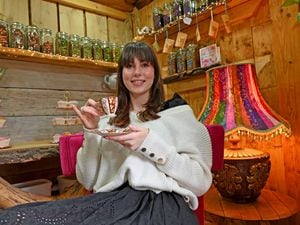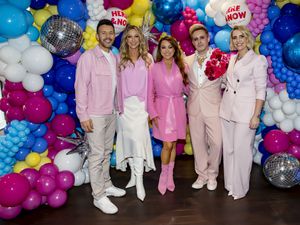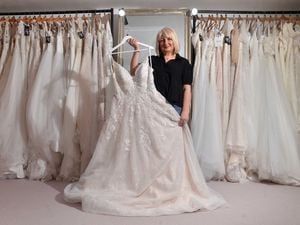Nothing like a quality cuppa: What it's like to be a tea and coffee merchant
Drinking tea is a very British tradition – so much so that 165 million cups are consumed every single day.
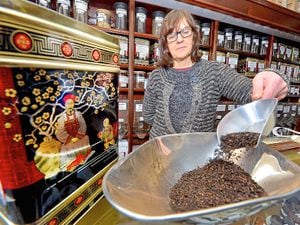
According to legend, it was discovered by the Chinese emperor Shen Nung in 2732 BC when a tea leaf fell into his hot water.
The beverage made it’s way to Europe in the early 17th century and today it’s the second most widely consumed drink in the world after water.
Brits will be celebrating the humble cuppa on National Tea Day on April 21 and someone who knows their Earl Grey from their Darjeeling is June Turner of Shropshire-based tea and coffee merchants Aroma.
She selects the teas that are going to tempt the tastebuds of visitors to their shop in St Mary’s Place, Shrewsbury.
Sales of loose leaf tea are booming up and down the country as more people turn their back on their trusty tea bags.
While using bags has simplified tea making by making brewing easier and cleaner, many of us are now choosing quality over convenience.
“We’re finding that people want to ditch the tea bags and drink loose leaf tea because they want a better quality tea.
“The leaves have more room to expand and release their flavour as they infuse than when they are confined in a tea bag.
“Most tea bags only contain cut up bits of tea leaves while loose leaf teas generally use the whole leaf.
“If you don’t want to wait, then a fine leaf is best as that will give you the colour straight away but if you want more control over the taste and colour, a bigger leaf size is best and that takes longer.
“It’s also about the environment because some tea bags contain plastic which is used to seal the bag.
“You can put loose leaf tea in an infuser, or use a strainer, which is washed and used again and then the used tea leaves can go in the compost bin when you’re done,” explains June.
The business was started in 1981 by her husband Andrew in partnership with his mother, Eileen, and father, Barrie, who had a wealth of experience in the catering industry.
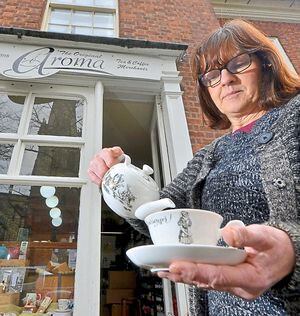
They opened a shop in Shrewsbury in 1981 with a roaster they bought from Vienna.
At first tea was sold from a separate site so that it wasn’t affected by the odour of the coffee but later the roasting side of the business was moved to new premises at Battlefield Enterprise Park.
Aroma sells more than 50 different loose leaf black, green and white teas as well as fruit-flavoured black teas, herbal teas and fruit infusions which are sourced from tea brokers in this country.
They offer decaffeinated varieties as well as their own Shropshire Brew which has been especially formulated for Shropshire water.
Described as a blend that cuts into the local water so ‘you can taste the tea, not the water’, it has proven very popular with customers and is also supplied to cafes and restaurants in the area.
“It’s a fine leaf tea which infuses quickly to create a strong British tea flavour. It was blended so you don’t get the chemical after taste you often get with the local water.
“We also have a Shropshire Roast coffee which was developed for the same reason,” says June.
So what makes the perfect cup of tea?
“You need fresh tea with a higher-grade leaf and a proper tea pot.
“For black tea make sure the water is freshly boiled.
“Don’t use water that’s been boiled twice as it will reduce the flavour. With green tea don’t use boiling water as it will make the tea taste sour.
“If you’re using a larger leaf, you’ve got to be patient and wait for it to colour. And for me it’s got to have milk – it’s just not tea without milk,” June tells Weekend.
When it comes to the variety of tea and the strength of the brew, that’s all down to personal taste, she says.
Today it is estimated that there are 1,500 different varieties of tea which are grown in some 36 countries.
“Every single tea has its own characteristics. Some people like a lighter brew like Darjeeling which is considered the champagne of teas.
“Assam has a very strong taste and Lapsang Souchong has a smokey taste which is dried over cedar wood.
“Some people come into the shop and will buy four or five different teas and make their own blend, others like a specific variety and will only buy that one,” explains June, who prefers Ceylon, green and chamomile varieties.
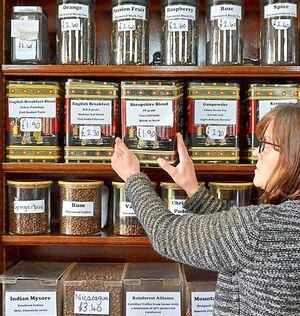
One tea we are all familiar with and one many of us may drink to start the day is English breakfast. “Every tea producer has their unique blend for English breakfast tea. Ours is a mix of Assam and Ceylon.
“It’s a large leaf blend which takes longer to brew but really draws out the flavour,” says June.
In recent years there has been talk of coffee replacing tea as the nation’s favourite hot beverage.
But June says she believes tea is still as popular as it ever was and we’re developing a new found love of loose leaf varieties.
“I think they are completely different markets. In the shop we get people who just drink tea or just drink coffee, and a fair few who drink both. Some days we will sell all coffee and some days it will be all tea.
“There is a lot of interest in fancy coffees and everything that comes with it but there are also a lot of people who are looking for quality teas.
“Afternoon tea has really taken off recently. People will be served loose leaf tea in a china tea pot and they want to replicate that at home.
“People also like the tradition and ceremony that goes with it.
“We are going back to the way things used to be,” says June.


